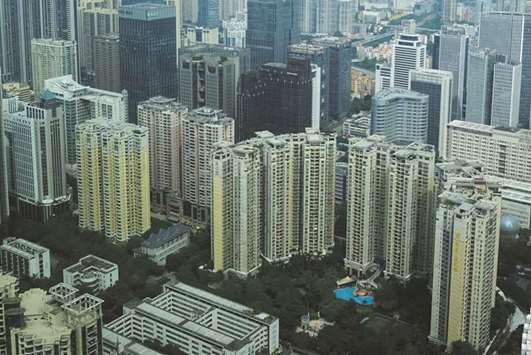Growth in China’s real estate investment eased in September and home sales fell for the first time since April, as developers dialled back expansion plans amid economic uncertainties and as additional curbs on speculative investment kicked in.
A cooling market could increase the downside risks to the world’s second-largest economy, which faces broader headwinds including an intensifying trade war with the United States.
However, while analysts acknowledge increasing caution in the property market, they say investment levels are still relatively high, suggesting a hard landing remains unlikely.
Growth in real estate investment, which mainly focuses on residential but also includes commercial and office space, rose 8.9% in September from a year earlier, compared with a 9.2% rise in August, Reuters calculated from National Bureau of Statistics (NBS) data out yesterday.
“I think overall, China’s real estate market is still resilient, and the decline in sales is within our expectations,” said Virginia Huang, Managing Director of A&T Services, CBRE Greater China.
“There is no sign that the government has relaxed their control, but it still has many methods and tools to support the market if the economy deteriorates rapidly,” Huang said.
Real estate has been one of the few bright spots in China’s investment landscape, partly due to robust sales in smaller cities where a government clampdown on speculation has been not as aggressive as it is in larger cities.
The market has struggled as authorities continued to keep a tight grip over the sector, ramping up control in hundreds of cities.
Transactions fell sharply over the period dubbed “Golden September and Silver October”, traditionally a high season for new home sales.
Property sales by floor area fell 3.6% in September from a year earlier, compared with a 2.4% gain in August, according to Reuters calculations, the first decline since April. In year-to-date terms, property sales rose 2.9% in the first three quarters.
China’s central bank governor Yi Gang said last week he still sees plenty of room for adjustment in interest rates and the reserve requirement ratio (RRR), as downside risks from trade tensions with the United States remain significant.
The government has implemented four RRR cuts this year, releasing hundreds of billions in new liquidity to the market.
China has for several years pushed a deleveraging campaign to reduce financial risks, clamping down on shadow banking and closing many “grey” financing channels for real estate firms.
For many highly leveraged developers, there are already signs of increasing caution as exemplified by a surge in failed land auctions due to tight liquidity and thinning margins.
New construction starts measured by floor area, an indicator of developers’ expansion appetite, rose 20.3% in September from a year earlier, compared with a 26.6% gain in August, Reuters calculations showed.
That’s against the backdrop of seemingly looser funding conditions for China’s real estate developers, who raised 12.2tn yuan ($1.76tn) in the first nine months, up 7.8% from the same period a year earlier, the NBS said.
The growth rate compared with a 6.9% increase in January-August period.
“Many developers will face lots of maturing debt by the end of this year, and there are perceived risks in the economy, so they will be more cautious,” Huang said.
China’s housing ministry is considering putting an end to the pre-sale system that developers use to secure capital quickly, in an effort to crack down on financial risks in the property sector. China’s home prices held up well in August, defying property curbs. But analysts expect additional regulatory tightening and slowing economic growth will soon take the wind out of the property market’s sails.

Residential and commercial buildings are seen in Guangzhou, China. Growth in real estate investment in China, which mainly focuses on residential but also includes commercial and office space, rose 8.9% in September from a year earlier, the National Bureau of Statistics data showed yesterday.
